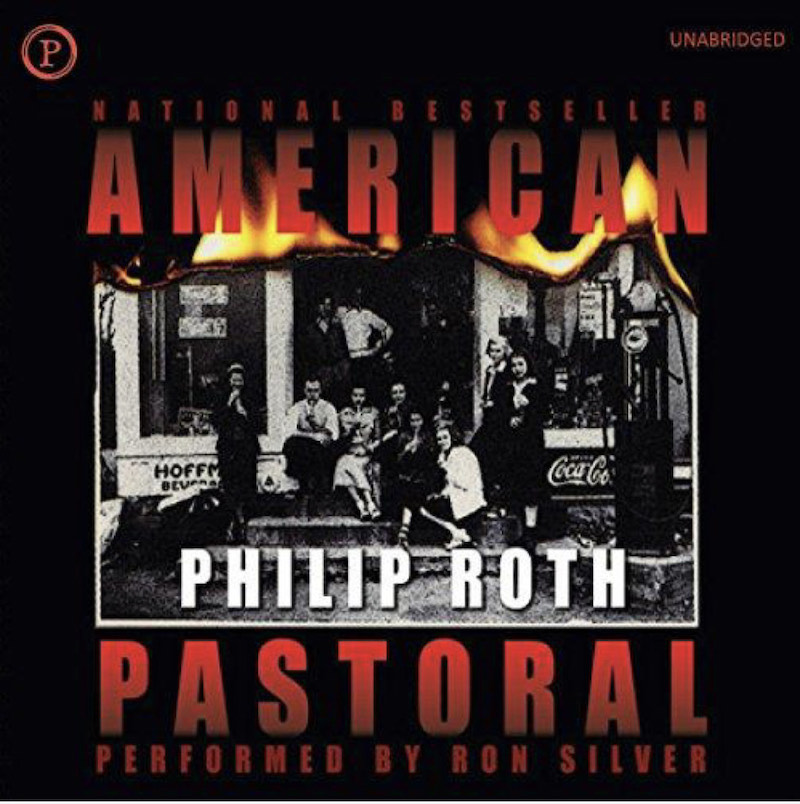
what i’m reading
Last weekend I took a solo road trip to Niagara Falls. It was a lovely getaway that included delicious food, beautiful natural surroundings, stimulating conversation, and sensual delights.
One of my favorite things to do on the road is to listen to audiobooks, something I don’t have time for at home! On this particular trip, I listened to Philip Roth’s American Pastoral, narrated by Ron Silver. Philip Roth is a writer that I have always admired for the candor with which he talks about writing, aging, taboo sexual desire, family, and the human condition.
American Pastoral is no exception, which should be no surprise given that it won the Pulitzer Prize in 1998. The book centers around the demise of a Jewish-American businessman and former star athlete, Seymour Levov. The narrative hinges on the revelation that Levov’s daughter Merry set off bombs that killed people while protesting the Vietnam War.
This central event in the Levov family creates a deep chasm within Levov’s life and being: his life is split between before and after the bombings; his being is divided between who he appears to be in society, and how he feels inside. He’s tormented by the gulf between the life of respectability that he is trying to project to the world, and the internal chaos that marks his family trauma. This tension is beautifully articulated at the end of chapter five:
“To the best of his ability, [his outer life] is conducted just as it used to be. But now, it is accompanied by an inner life, a gruesome inner life of tyrannical obsessions, stifled inclinations, superstitious expectations, horrible imaginings, fantasy conversations, unanswerable questions, sleeplessness, and self-castigations night after night… In the everyday world, nothing to be done but respectably carry on the huge pretense of living as himself. With all the shame of masquerading as the ideal man.”
While most of us do not carry a weight as historically significant as Levov’s, it is almost impossible to not feel a tension between what others expect us to be, and who we feel we are. Moreover, as should be clear by the centrality of the Vietnam War and the anti-war protests that accompanied it (not to mention the book’s title), this is a uniquely American story, a commentary on the normative expectations of what family, career, and responsibility are supposed to look like within our cultural milieu. The use of the words “ideal man” is no accident. From the outside in, Levov had everything, accompanied by the charm and charisma that made his life enviable. But we learn—along with him—that he is upholding ideals that no longer match who he is, and that there is a cost to doing so.

what I’m thinking about
While my concerns are not Levov’s, the novel was thought-provoking on so many levels. Most immediately, it made me think back to reading Jane Ward’s book, Not Gay: Sex Between Straight White Men. This may sound like a stretch but stick with me.
While American Pastoral is not a book about sexual orientation per se (though there are some homosexual—and otherwise non-normative—relationships in the book), it is a book about working hard to uphold the values of normalcy and respectability that our culture demands.
In Not Gay, Ward argues that this is what heterosexuality and heteronormativity do: they work to promote social norms which extend beyond who or how anyone fucks. Heterosexuality is about upholding the status quo, which is much broader than simply who one is attracted to. Heteronormativity may well be about desire, but not desire that can be reduced to sex.
“[Heterosexuality] is the desire not simply for heterosexual sex and partnership, but for all of its concomitant cultural rewards,” Ward suggests. “What we are desiring may not be body parts or people who fall within particular sex and gender categories, but the far broader experience of sexual and gender normalcy and difference.”
More to the point, Ward says, “Heterosexuality is, in part, a fetishization of the normal.” Queerness, along these lines, is a “desire for rebellion, differentness, or outsiderness.” Or, as a friend of mine used to say, “Not gay as in happy, but queer as in ‘fuck you.’”
Queerness is a rebellion against the status quo, one that refuses to adopt normative cultural expectations. It is an identity that takes the opposite stance of Levov, who tries so hard to maintain normalcy, despite feeling like it is a masquerade.

This is perhaps on my mind because it is Pride Month and I always reflect on queer identity during the month of June. While I am queer in the conventional sense of the word—I am attracted to many types of bodies, have had significant relationships with both men and women, etc.—I also believe that Ward’s definition of queerness is broad enough to encompass my more immediate community: that of sex workers. Not only do sex workers have an unconventional relationship to labor/money and sexuality (two of the most intensely held beliefs in our culture), but they are also historically the ones to catapult the LGBTQ movement.
If you are spending any time reflecting on Pride Month, I also suggest that you think about it through the lens of solidarity with sex workers.
what I’m excited for
I’ll be in NYC for the next four days!
While I’m not looking forward to getting up early for my flight, I’m very excited about seeing both old and new friends, and doing a couple of photo shoots!
If you are in New York and you would like to connect, I’d love to hear from you!
availability & booking
As I said, I’ll be in New York until Monday, and then I’ll be back in Pittsburgh for the rest of the month.
My schedule is getting pretty full for June, but please do reach out if you would like to get together in New York or Pittsburgh. I’m sure we can find a time!